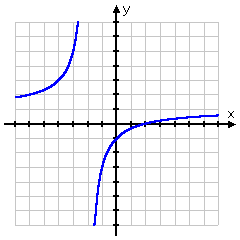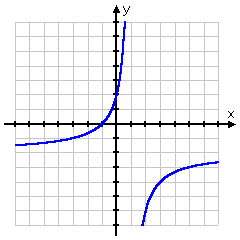How To Find The Inverse Of A Rational Function
Finding the Inverse of a Function (page five of 7)
Sections: Definition / Inverting a graph, Is the changed a function?, Finding inverses, Proving inverses
- Notice the inverse f(x) = (x � 2) / (x + 2), where 10 does non equal �2 .
Is the inverse a role?
| First, I recognize that f(10) is a rational function. Here's its graph: | |
The restriction on the domain comes from the fact that I can't divide by zero, and then x can't exist equal to �two . I ordinarily wouldn't carp writing downward the restriction, just it's helpful hither because I need to know the domain and range of the inverse. Notation from the picture (and recalling the concept of horizontal asymptotes ) that y will never equal 1 . Then the domain is " x is not equal to �2" and the range is " y is non equal to 1". For the inverse, they'll be swapped: the domain will be " x is not equal to 1" and the range will exist " y is not equal to �2". Here's the algebra:
| The original function: | |
| I rename " f(x) " as " y ": | |
| Then I solve for " x =": | |
| | |
| I go the ten -stuff on one side: | |
| Here'southward the pull a fast one on: I factor out the x ! | |
| | |
| Then I switch 10 and y : | |
| And rename " y " equally " f -inverse"; the domain restriction comes from the fact that this is a rational function. | |
| Since the inverse is but a rational function, then the changed is indeed a function. Hither'southward the graph: | |
Then the changed is y = (�two x � 2) / ( x � i) , and the inverse is also a function, with domain of all 10 non equal to i and range of all y non equal to �two .
- Observe the inverse of f(x) = ten 2 � iiix + two,x < 1.five
| With the domain restriction, the graph looks similar this: From what I know about graphing quadratics , the vertex is at ( x, y) = (1.five, �0.25) , so this graph is the left-hand "half" of the parabola. | |
This one-half of the parabola passes the Horizontal Line Test, so the (restricted) part is invertible. But how to solve for the inverse? Copyright � Elizabeth Stapel 2000-2011 All Rights Reserved
| The original part: | f(ten) = x two � 3x + 2 |
| I rename " f(x) " as " y ": | y = x 2 � threex + 2 |
| Now I solve for " ten =" by using the Quadratic Formula : | 0 = 10 2 � 3x + 2 � y |
| | |
| Since 10 < 1.5 , and so I desire the negative square root: | |
| Now I switch x and y : | |
| And rename " y " every bit " f -inverse"; the domain restriction comes from the fact that this is a rational function. | |
Then the inverse is given by:
![]()
<< Previous Pinnacle | 1 | ii | three | iv | v | 6 | 7| Return to Index Next >>
| Cite this commodity as: | Stapel, Elizabeth. "Finding the Inverse of a Function." Purplemath. Available from |
Source: https://www.purplemath.com/modules/invrsfcn5.htm
Posted by: nadeauappidint96.blogspot.com




![x = [3 � sqrt(1 + 4y)]/2](https://www.purplemath.com/modules/inverse/invers79.gif)

0 Response to "How To Find The Inverse Of A Rational Function"
Post a Comment